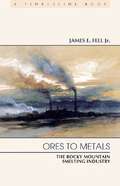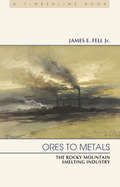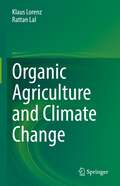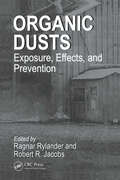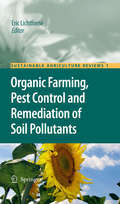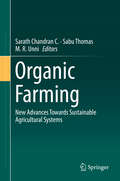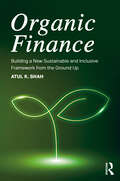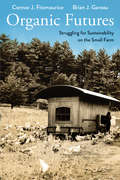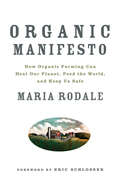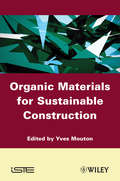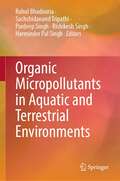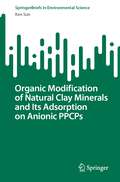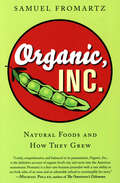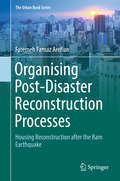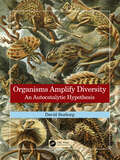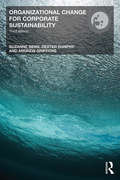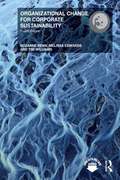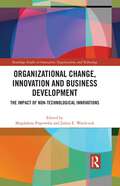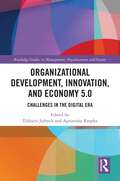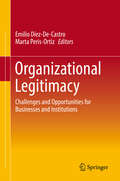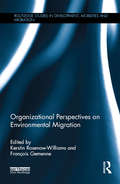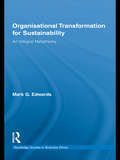- Table View
- List View
Ores to Metals
by James FellThis comprehensive treatment of the smelting industry of Colorado, originally published in 1979, is now back in print with a new preface by the author. Packed with fascinating statistics and mining data, Ores to Metals details the people, technologies, and business decisions that have shaped the smelting industry in the Rockies. Although mining holds more of the glamour for those in and interested in the minerals industry, smelters have continuously played a critical role in the industry's evolution since their introduction in Colorado in the 1860s. At that time, miners desperately needed new technology to recover gold and silver from ores resistant to milling. Beginning as small independent enterprises, progressing to larger integrated firms working in urban centers, and finally following a trend toward mergers, the entire industry was absorbed into one large holding company - the American Smelting and Refining Company. Over time, fortunes were won and lost, business success was converted to political success, and advances were made in science and metallurgy. Drawing on archival material, Fell expertly presents the triumphs and troubles of the entrepreneurs who built one of the great industries of the West.
Ores to Metals: The Rocky Mountain Smelting Industry (Timberline Books)
by James E. Fell, Jr.This comprehensive treatment of the smelting industry of Colorado, originally published in 1979, is now back in print with a new preface by the author. Packed with fascinating statistics and mining data, Ores to Metals details the people, technologies, and business decisions that have shaped the smelting industry in the Rockies. Although mining holds more of the glamour for those in and interested in the minerals industry, smelters have continuously played a critical role in the industry’s evolution since their introduction in Colorado in the 1860s. At that time, miners desperately needed new technology to recover gold and silver from ores resistant to milling. Beginning as small independent enterprises, progressing to larger integrated firms working in urban centers, and finally following a trend toward mergers, the entire industry was absorbed into one large holding company—the American Smelting and Refining Company. Over time, fortunes were won and lost, business success was converted to political success, and advances were made in science and metallurgy. Drawing on archival material, Fell expertly presents the triumphs and troubles of the entrepreneurs who built one of the great industries of the West.
Organic Agriculture and Climate Change
by Klaus Lorenz Rattan LalThis book will collate, review and synthesize information on how Organic Agriculture (OA) practices affect and are affected by climate change, in comparison to the more widely used conventional agricultural practices. Pros and cons of OA practices will be discussed separately for croplands, pasture lands, mixed livestock cropping systems, vegetable fields, fruit and tree orchards, and vineyards. The book concludes with an overview on how conventional and OA practices can be prudently and discriminately combined to identify and adopt climate-resilient agro-ecosystems under site-specific conditions.
Organic Dusts Exposure, Effects, and Prevention
by Ragnar Rylander Robert R. JacobsOrganic dusts are particles of vegetable, animal, and microbial origin and are found in a wide range of occupational and general environments. This comprehensive handbook discusses organic dusts and their effects on man. Organic Dusts describes the different environments in which organic dusts are present; it also explains the major components of dusts and which diseases they can induce after inhalation. The first book to completely cover this important environmental exposure, this valuable reference presents a systematic approach to disease pathology and offers revised terminology for diagnosis based on the latest information on cell reactions and the functioning of the immune system.
Organic Farming, Pest Control and Remediation of Soil Pollutants
by Eric LichtfouseSustainable agriculture is a rapidly growing field aiming at producing food and energy in a sustainable way for humans and their children. Sustainable agriculture is a discipline that addresses current issues such as climate change, increasing food and fuel prices, poor-nation starvation, rich-nation obesity, water pollution, soil erosion, fertility loss, pest control, and biodiversity depletion. Novel, environmentally-friendly solutions are proposed based on integrated knowledge from sciences as diverse as agronomy, soil science, molecular biology, chemistry, toxicology, ecology, economy, and social sciences. Indeed, sustainable agriculture decipher mechanisms of processes that occur from the molecular level to the farming system to the global level at time scales ranging from seconds to centuries. For that, scientists use the system approach that involves studying components and interactions of a whole system to address scientific, economic and social issues. In that respect, sustainable agriculture is not a classical, narrow science. Instead of solving problems using the classical painkiller approach that treats only negative impacts, sustainable agriculture treats problem sources. Because most actual society issues are now intertwined, global, and fast-developing, sustainable agriculture will bring solutions to build a safer world. This book series gathers review articles that analyze current agricultural issues and knowledge, then propose alternative solutions. It will therefore help all scientists, decision-makers, professors, farmers and politicians who wish to build a safe agriculture, energy and food system for future generations.
Organic Farming: New Advances Towards Sustainable Agricultural Systems
by Sabu Thomas C. Sarath Chandran M. R. UnniThis volume provides an overview of the fundamental concepts and recent advancements in organic farming, a form of agriculture that is increasing rapidly in popularity. Readers will discover information on the history of organic farming, environmental friendly practices and challenges, and innovations in the field.The chapter authors analyze pertinent aspects of this integrated farming system including strategies to improve seed quality, methods to improve soil fertility, and the advantages of using organic fertilizers. Particular attention is also given to weed management practices, bioenergy production and insights into the ways organic farming can adapt to global climate change and build sustainable food systems for future generations. Scientists, decision-makers, professors, and farmers who wish to work towards making agricultural systems more sustainable will find this book appealing.
Organic Finance: Building a New Sustainable and Inclusive Framework from the Ground Up
by Atul K. ShahModern finance science is profoundly broken and damaging, morally and culturally. It has no choice but to change its theory and pedagogy – but the question is how and in what ways? We urgently need to see the world from a very different, kinder, gentler and more caring paradigm. In truth, the planet is bio-diverse, and so is society, with a huge tapestry of faiths, customs, beliefs and practices in finance. A holistic approach is urgently needed. This book builds a new un-anthropocentric moral and sustainable finance from the ground up, helping students, professionals and scientists to reconstruct the knowledge and connect it to indigenous beliefs and timeless wisdom. An interdisciplinary, nontechnical approach is adopted. Respect for all living beings, the protection of forests, soil and soul, and the importance of trust, culture and relationships are critical to building harmonious communities. Examples and techniques to re-engineer finance science are offered throughout the book.
Organic Futures: Struggling for Sustainability on the Small Farm
by Brian Gareau Connor J. FitzmauriceAn exploration of the lived experience of small-scale organic farmers in New England that unpacks how they balance their ideals with economic realities In recent years, the popularity of organically grown produce has exploded. In 2014, organic fruits and vegetables accounted for 12% of all produce sales in the United States, with $39 billion in consumer sales reported for 2015. As a federally recognized niche market within the agricultural mainstream, organic farming is increasingly on display in American grocery stores. Yet the organic food most Americans consume today is produced by an industrial food system at odds with the practices and ideals of small-scale farmers. Taking an ethnographic approach, the fieldwork by Connor Fitzmaurice and Brian Gareau at a small New England organic farm sheds light on how farmers navigate the difficult terrain between practices of sustainability and the economic realities of contemporary agriculture. Drawing on extensive research, Fitzmaurice and Gareau examine the historical context, complexities, and viability of nonconventional organic farming practices: practices that seek to balance ecology and community with the business of agriculture.
Organic Manifesto: How Organic Food Can Heal Our Planet, Feed the World, and Keep Us Safe
by Maria RodaleRodale was founded on the belief that organic gardening is the key to better health both for us and for the planet, and never has this message been more urgent. Now, with Organic Manifesto, Maria Rodale, chairman of Rodale, sheds new light on the state of 21st century farming. She examines the unholy alliances that have formed between the chemical companies that produce fertilizer and genetically altered seeds, the agricultural educational system that is virtually subsidized by those same companies, and the government agencies in thrall to powerful lobbyists, all of which perpetuate dangerous farming practices and deliberate misconceptions about organic farming and foods. Interviews with government officials, doctors, scientists, and farmers from coast to coast bolster her position that chemical-free farming may be the single most effective tool we have to protect our environment and, even more important, our health.
Organic Materials for Sustainable Civil Engineering
by Yves MoutonThis book provides an inventory of organic materials and products, the major components of all civil engineering projects, in terms of their scientific and technical background, including the regulations that cover their use and their predicted useful life. Such materials include: bitumen on the roads; geotextiles for retaining walls; membranes for bridges; tunnel and reservoir waterproofing; paint binders to protect metallic and concrete structures or to realize road markings; injection resins; gluing products; concrete admixtures; and composite materials.The presentation is based on a physicochemical approach, which is essential if these products are to be considered as part of sustainable development: as such, those studying or working in these fields will find this an invaluable source of information.
Organic Micropollutants in Aquatic and Terrestrial Environments
by Pardeep Singh Rishikesh Singh Rahul Bhadouria Sachchidanand Tripathi Harminder Pal SinghThis book offers a comprehensive overview of the origins, occurrences, and remediation strategies for organic micropollutants in the environment. Divided into five parts, the book starts with a perspective on the sources and prevalence of organic micropollutants in our world, including aquatic ecosystems and urban soils, followed by an examination of the effects of these contaminants on health, agriculture, and the environment. In the third and fourth parts of the book, readers will learn more about the analysis and detection of organic micropollutants, and treatment and remediation strategies, respectively. The book closes with an overview of policies and regulatory measures, and critiques the fate of organic micropollutants in the aquatic environment. In this book, particular attention is given to topics such as: the intricate relationship between micropollutants, the environment, and human healthsustainable management, treatment methodsand remediation for micropollutants in wastewater, urban water systems, freshwaters, urban soils, and agricultureecotoxicity analysis and innovative bioremediation approachesReaders will also find a valuable discussion of the current contamination status of aquatic ecosystems by pharmaceutical and personal care micropollutants, the latest methodologies for analysing organic micropollutants, and a case study on the biodegradation pathways of hexachlorocyclohexane (HCH). Given its breadth, this book is a useful resource for scientists, researchers, policymakers, and anyone concerned about the ecological and human health impacts of organic micropollutants.
Organic Modification of Natural Clay Minerals and Its Adsorption on Anionic PPCPs (SpringerBriefs in Environmental Science)
by Ken SunThis book mainly investigates the adsorption of anionic diclofenac sodium on natural clay minerals, the adsorption of anionic chloramphenicol on natural clay minerals and the behavior of surface and interface modification or adsorption on clay minerals. It has significant guidance for learning the transfer and fate of pharmaceuticals and personal care products (PPCPs) in the soil. It develops an efficient, low-cost adsorbent material and provides theoretical basis and valuable reference for the effective prevention of groundwater contamination of PPCPs in the field of environmental engineering.
Organic, Inc.: Natural Foods and How They Grew
by Samuel FromartzWho would have thought that a natural food supermarket could have been a financial refuge from the dot-com bust? But it had. Sales of organic food had shot up about 20 percent per year since 1990, reaching $11 billion by 2003 . . . Whole Foods managed to sidestep that fray by focusing on, well, people like me. Organic food has become a juggernaut in an otherwise sluggish food industry, growing at 20 percent a year as products like organic ketchup and corn chips vie for shelf space with conventional comestibles. But what is organic food? Is it really better for you? Where did it come from, and why are so many of us buying it? Business writer Samuel Fromartz set out to get the story behind this surprising success after he noticed that his own food choices were changing with the times. In Organic, Inc., Fromartz traces organic food back to its anti-industrial origins more than a century ago. Then he follows it forward again, casting a spotlight on the innovators who created an alternative way of producing food that took root and grew beyond their wildest expectations. In the process he captures how the industry came to risk betraying the very ideals that drove its success in a classically complex case of free-market triumph.
Organising Post-Disaster Reconstruction Processes: Housing Reconstruction after the Bam Earthquake (The Urban Book Series)
by Fatemeh Farnaz ArefianThrough a synthesis of a broader inter-disciplinary literature in the field of disaster studies, organisation theory and management, and an in-depth case study this book provides an analytical framework for organising post-disaster reconstruction programmes which aim to reduce future disaster risks and achieve other objectives. It explores the role of organisational design and management on approaching and achieving the objectives of the reconstruction programme in Iran after the 2003 Bam earthquake. The housing reconstruction programme in Bam was a complex case, offering various learning opportunities to understand organising reconstruction processes especially in urban areas. The case study research explores how the urban housing reconstruction programme system was formed purposefully towards the delivery of the stated objectives and created an innovative housing process throughout the urban area. It identifies consistencies and inconsistencies among the influential organisational attributes of the programme delivery system formation. The system evolved through corrective adjustments (either formally or informally) during its implementation to reflect unfolding consequences of inconsistencies in initial formation and emerging contextual issues in the field.
Organisms Amplify Diversity: An Autocatalytic Hypothesis
by David SeaborgThis book presents a hypothesis and evidence that organisms promote and ecosystems maximize biodiversity. All species have a net positive effect on their environment, other species, and diversity. The sun is 30% hotter than when life began, but the temperature has been kept moderate by life. Life created high oxygen, the ozone layer, and fertile soil, a diverse, living system. No species evolves in isolation, and most evolution is coevolution. The nature and number of links between species are as important as species number. Eukaryotes coevolve with complex ecosystems of microbes with which they exchange genes. Genomes and intraspecific interactions both act to promote evolution and diversification. Viruses increase diversity of their hosts and cause macroevolutionary transitions. Key Features Life alters the Earth in ways that increase biodiversity All species make their environment better for other species and promote diversity Life created the life-friendly atmosphere, temperature, and soil of today
Organizational Behavior: Bridging Science and Practice
by Talya Bauer Berrin ErdoganBy expertly weaving together the equally important strands of management theory and practice, Organizational Behavior: Bridging Science and Practice provides students with the key vocabulary, conceptual frameworks, and critical thinking skills necessary to diagnose work-based interactions, ask pertinent questions, evaluate gathered data, and act in an effective and ethical manner regardless of situational characteristics. Version 3.0 is aligned with Lead: The Simulation, an online learning experience.
Organizational Change for Corporate Sustainability
by Andrew Griffiths Suzanne Benn Dexter DunphySince this classic book was first published in 2003, sustainability has increasingly become mainstream business for leading corporations, whilst the topic itself has also been a hotly debated political issue across the globe. The sustainability phase models originally discussed in the book have become more relevant with ever more examples of organizations at later stages in the development of corporate sustainability. Bringing together global issues of ecological sustainability, strategic human resource management, organizational change, corporate social responsibility, leadership and community renewal, this new edition of the book further develops its unified approach to corporate sustainability and its plan of action to bring about corporate change. It integrates new research and brings illustrative case studies up to date to reflect how new approaches affect change and leadership. For the first time, a new positive model of a future sustainable world is included - strengthened by references to the global financial crisis, burgeoning world population numbers and the rise of China. With new case studies including BP's Gulf oil spill and Tokyo Electric Company's nuclear reactor disaster, this new edition will again be core reading for students and researchers of sustainability and business, organizational change and corporate social responsibility.
Organizational Change for Corporate Sustainability: A Guide For Leaders And Change Agents Of The Future (Understanding Organizational Change Ser.)
by Tim Williams Suzanne Benn Melissa EdwardsSince this classic book was first published in 2003, sustainability has increasingly been accepted as standard business practice for leading corporations, while the science itself has revealed how human activity has become the dominant force influencing irreversible changes in the planetary systems. The fourth edition of this trailblazing book on corporate sustainability provides new insights into how organizations can transition towards a more responsible way of conducting their business. It charts new thinking on value creation, business models and organizational purpose as the basis of a broader-based transition to a sustainable society. The sustainability phase model has been substantially revised to incorporate emergent approaches in sustainable supply chain management, strategic sustainability, sustainability-oriented innovation and new business models. There is a companion website that contains a range of materials to support learning. This new edition with the authors’ unified approach to sustainable business reshapes its plan of action to bring about corporate change by drawing in new management theory and practice on strategy-making and leadership, making it core reading for students and researchers of sustainability and business, organizational change and corporate social responsibility.
Organizational Change, Innovation and Business Development: The Impact of Non-Technological Innovations (Routledge Studies in Innovation, Organizations and Technology)
by Magdalena Popowska Julita E WasilczukThis volume presents a collection of different views and perspectives, featuring both theoretical and empirical contributions, to provide deep insight into the role of innovation and of non-technological innovation (NTI) in contemporary business. It illustrates how NTI encourages organizational development as well as competitive advantage. Chapters display a variety of research methods, both qualitative and quantitative, including case studies, best practices, surveys, novel approaches to interpretations, concepts and theories. Together they contribute to a significant extension of the existing knowledge on non-technological innovations and their role in organizations. This volume highlights the effects of marketing and organizational innovation strategies on companies’ innovation and overall performance, while demonstrating that the effects of NTI may vary depending on the phase of the innovation process, and how it differs within small, medium and large enterprises from manufacturing and service industries. It explores the bidirectional relationship between technological innovation (TI) and NTI, and considers the competences needed to implement NTI. The book is written for scholars and academic professionals from a wide variety of disciplines addressing issues of organizational change and innovation, new management techniques and strategies, and the sustainable growth of organizations. It may also be an interesting source of knowledge for graduate and postgraduate students in management.
Organizational Change, Innovation and Business Development: The Impact of Non-Technological Innovations (Routledge Studies in Innovation, Organizations and Technology)
by Magdalena Popowska Julita E WasilczukThis volume presents a collection of different views and perspectives, featuring both theoretical and empirical contributions, to provide deep insight into the role of innovation and of non-technological innovation (NTI) in contemporary business. It illustrates how NTI encourages organizational development as well as competitive advantage.Chapters display a variety of research methods, both qualitative and quantitative, including case studies, best practices, surveys, novel approaches to interpretations, concepts and theories. Together they contribute to a significant extension of the existing knowledge on non-technological innovations and their role in organizations. This volume highlights the effects of marketing and organizational innovation strategies on companies’ innovation and overall performance, while demonstrating that the effects of NTI may vary depending on the phase of the innovation process, and how it differs within small, medium and large enterprises from manufacturing and service industries. It explores the bidirectional relationship between technological innovation (TI) and NTI, and considers the competences needed to implement NTI.The book is written for scholars and academic professionals from a wide variety of disciplines addressing issues of organizational change and innovation, new management techniques and strategies, and the sustainable growth of organizations. It may also be an interesting source of knowledge for graduate and postgraduate students in management.
Organizational Development, Innovation, and Economy 5.0: Challenges in the Digital Era (Routledge Studies in Management, Organizations and Society)
by Agnieszka Rzepka Elżbieta JędrychThis edited collection comprehensively explores Economy 5.0, focusing on critical aspects such as organizational development, intellectual capital, soft agent dynamics, and agility. Through in-depth analysis, real-world case studies, and forward-looking perspectives, the book provides readers with practical insights into the challenges and opportunities that define contemporary organizations and skills that can be applied in different cultural and organizational contexts. The overarching goal is to empower individuals to thrive in the dynamic economic landscape of Economy 5.0 by promoting sustainable practices, fostering future-proof skill sets, encouraging ethical leadership, and inspiring innovative solutions. It addresses issues and trends that are universally relevant in today's globalized world, offering a multidisciplinary perspective that will make it valuable to researchers, academics, practitioners, and students in the fields of organizational development, management, innovation, sustainability, and ethical leadership.
Organizational Legitimacy: Challenges And Opportunities For Businesses And Institutions
by Marta Peris-Ortiz Emilio Díez-De-CastroThis volume explores organizational legitimacy in business, featuring examples from a variety of industries around the world. Synthesizing the most current theoretical insights and best practices, the contributing authors examine the ways in which organizational legitimacy can be understood, its perceived influence on the market, and the relationship between organizational legitimacy and overall organizational success. The authors draw from different methodological perspectives to develop a holistic approach to organizational legitimacy that transcends the traditional concepts of corporate reputation, business ethics or corporate social responsibility. Historically, efforts to understand how organizations acquire, manage and use legitimacy have applied insights from institutional theory, resource dependence theory, organizational ecology and stakeholder theory, but the field has remained fragmented, despite the profound implications of achieving legitimacy for ensuring organizational stability, survival and sustainability through access to capital, resources and business opportunities, as well as problem solving, performance measurement and stakeholder support. Presenting case studies of successful initiatives, the book addresses: · How organizational legitimacy is defined and measured · How organizations achieve legitimacy and how they acquire resources · How different stakeholders (e.g., consumers, investors, employees) make legitimacy judgments and resource allocation decisions · Whether audiences in the same socio-cultural context arrive at shared legitimacy judgments with regard to a focal organization
Organizational Perspectives on Environmental Migration (Routledge Studies in Development, Mobilities and Migration)
by Kerstin Rosenow-Williams François GemenneOver the past decade, international organizations (IOs) and non-governmental organizations (NGOs) have increasingly focused their efforts on the plight of environmental migrants in both industrialized and developing countries. However, to date very few studies have analysed the influence and rhetoric of advocacy groups in the debates on environmental migration. Organizational Perspectives on Environmental Migration fills this lacuna by drawing together and examining the related themes of climate change and environmental degradation, migration and organizational studies to provide a fresh perspective on their increasing relevance. In order to assess the role of IOs and NGOs in the environmental migration discourse and to understand their interaction and their ways of addressing the topic, the book contains a wide-range of contributions covering the perspectives of organizational sociologists, political scientists, anthropologists, geographers, lawyers and practitioners. The chapters are organized thematically around the perspectives of key actors in the area of environmental migration, including IOs, courts and advocacy groups. The geographically diverse and interdisciplinary range of contributions makes this volume an essential foundational text for organizational responses to environmental migration. This volume will be of great interest to students and scholars of migration studies, international relations, organizational sociology, refugee law and policy, and development studies.
Organizational Transformation for Sustainability: An Integral Metatheory (Routledge Studies in Business Ethics)
by Mark EdwardsDuring the 21st century organizations will undergo a level of radical and global change that has rarely been seen before. This transformation will come as a result of the environmental, social and economic challenges that now confront organisations in all their activities. But are our understandings and theories of change up to the task of meeting these challenges? Will we be able to develop sustaining visions of how organizations might contribute to the long-term viability of our interdependent global communities? Organizational Transformation for Sustainability: An Integral Metatheory offers some innovative answers to the big questions involved in organizational sustainability and the radical changes that organizations will need to undergo as we move into the third millennium. This new approach comes from the emerging field of integral metatheory. Edwards shows how a "Big Picture" view of organisational transformation can contribute to our understanding of, and search for, organisational sustainability. There are four key themes to the book: i) the need for integrative metatheories for organisational change; ii) the development of a general research method for building metatheory; iii) the description of an integral metatheory for organisational sustainability; and iv) the discussion of the implications of this metatheory for organisational change and social policy regarding sustainability. This book brings a unique and important orienting perspective to these issues.
Organizations and the Natural Environment: Innovations in Sustainability
by Alfred A. MarcusTo what extent can competition between companies encourage innovations in sustainability that have the potential to solve some of the world's major challenges? Using a series of case studies, this book pits closely related competitors against each other to examine the progress in and obstacles to the evolution of sustainable innovations in energy efficiency, solar power, electric vehicles and hybrids, wind energy, healthy eating, and agricultural productivity. It delves into the efforts of Tesla Motors to bring about a revolution in personal transportation, and the challenges Toyota and General Motors (GM) confront in commercializing hybrids. It explores the movement to healthy food by cereal companies General Mills and Kellogg's, and depicts the battles between Whole Foods and Walmart for the world's palate. By examining the experiences that particular businesses have had with sustainable innovation, this insightful book reflects upon lessons learned and encourages readers to think carefully about the challenges that lie ahead.
